2012版人教社新目标英语七年级下册Unit-11单元第3课时教案
(新)人教版新目标七年级英语下册(Unit11-Unit12)集体备课教案设计
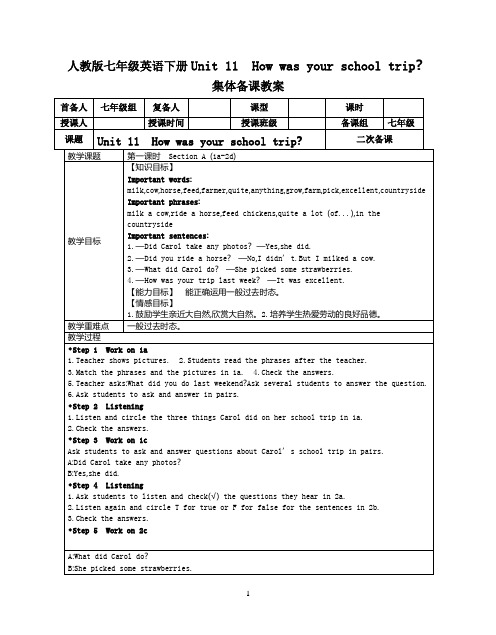
人教版七年级英语下册Unit 11How was your school trip?集体备课教案人教版七年级英语下册Unit 11How was your school trip?集体备课教案人教版七年级英语下册Unit 11How was your school trip?集体备课教案人教版七年级英语下册Unit 11How was your school trip?集体备课教案人教版七年级英语下册Unit 12What did you do last weekend?集体备课教案人教版七年级英语下册Unit 12What did you do last weekend?集体备课教案人教版七年级英语下册Unit 12 What did you do last weekend ?集体备课教案首备人 七年级组 复备人 课型 课时 授课人授课时间授课班级备课组七年级课题Unit 12 What did you do last weekend ?二次备课Keys :1.did ;stayed 2.are wearing 3.was 4.went 5.were ;was 教学反思教学课题 第三课时 Section B (1a-2c ) 教学目标 【知识目标】Important words : fly ,kite ,high ,ago ,India ,moon ,surprise ,snake ,move ,start ,jump ,wake ,forest ,into ,ear Important phrases : high school ,put up ,get a surprise ,shout to...,wake...up ,as a special gift ,tell stories ,know about Important sentences :1.But I was so tired that I went to sleep early.2.The next morning ,my sister and I got a terrible surprise.3.When we looked out of our tent ,we saw a big snake sleeping near thefire.4.We shouted to our parents to let them know about the danger.5.What lesson did Lisa learn from the weekend ?6.This woke the snake up and it moved into the forest near the lake. 【能力目标】能够正确运用一般过去时介绍周末生活。
七年级英语下册Unit11第3课时教案分析

七年级英语下册Unit 11 第3时教案分析七年级英语下册Unit11第3时教案分析第三时SetinB【学习目标】通过听读、经历学生能正确读译和拼写单词useu。
2【学习重点】提高听说能力正确运用新单词及一样过去时。
【学习难点】用一样过去时描述自己及他人的旅行经历使学生体验到分享体会的欢乐。
【学习提示】Assequestinsbshingthephts1【学习提示】Revietherdseirhineseeaningsinthetext【学法指导】exited表示“兴奋的”指人、物对……感到兴奋;表示“令人兴奋的;令人兴奋的”指人、事、物本身让人兴奋、兴奋。
一样情形下人作主语用-ed;物作主语用-ing。
一样的道理其他类似的词surprising/surprised;interesting/interested等也是如此区分的。
2【学习提示】Finish1aingrups2.hetheansers3.Asstudentstlistent1b,1andfinishitThenlistenagainandrepeat【学法指导】beinterestedin【用法】对……感爱好【举例】IainterestedinEnglish我对英语感爱好。
情景导入生成问题.Questin:hat'sthisinthepiture?:_________________________________________________________ _______________2Questin:hat'shedinginthesiingpl?:________________________________________________________________________自学互研生成能力Tas1 Let'sreadnerdsIanread2.Ianrite参观消防站参观博物馆u去钓鱼登山去乡下画画去动物园看一些油画3.Iansuarize认真观看上面的动词短语写出他们的过去式并归类。
人教版七年级下册Unit11教案设计sectionAGrammarFocus3b
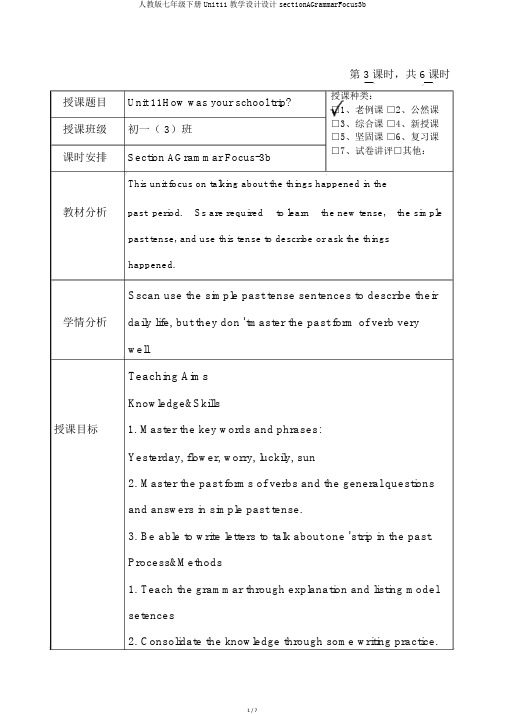
第 3课时,共 6课时授课题目Unit 11How was your school trip? 授课班级初一( 3)班课时安排Section AGrammar Focus-3b 授课种类:□1、老例课□2、公然课□3、综合课□4、新授课□5、坚固课□6、复习课□7、试卷讲评□其他:This unit focus on talking about the things happened in the教材分析past period. Ss are required to learn the new tense, the simple past tense, and use this tense to describe or ask the thingshappened.Sscan use the simple past tense sentences to describe their 学情分析daily life, but they don ’tmaster the past form of verb very well.Teaching AimsKnowledge&Skills授课目标 1. Master the key words and phrases:Yesterday, flower, worry, luckily, sun2. Master the past forms of verbs and the general questionsand answers in simple past tense.3. Be able to write letters to talk about one ’strip in the past.Process&Methods1. Teach the grammar through explanation and listing modelsetences2. Consolidate the knowledge through some writing practice.授课重点和难点Emotion, Attitudes&Values1.Lead Ss to share one ’s experiences and joy with each others.Important points1.Master the past forms of verbs and the general questions and answersin simple past tense.2.Be able to write letters to talk about one ’s trip in the past.Difficult points1.The past form of verbs and the general questions and answers insimple past tense.授课思路设计内容与方法选择:Situational Communicative授课工具的说明和使用:multi-media Approach, Task-based Approach, Multimedia Display tools, blackboard.Approach, Team Cooperation Approach授课步骤有关说明1. Grammar Focus总结语法规律,理解句子构造及用法。
Unit 11 How was your school trip人教版新目标七年级下册英语优秀教学设计 初一教案有教学反思
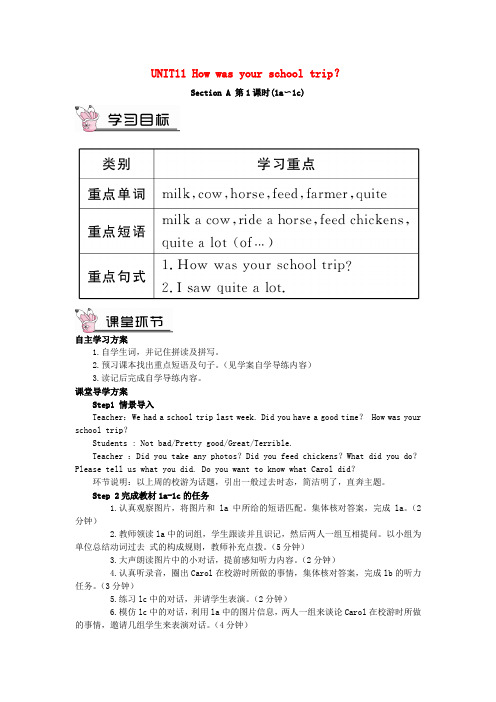
UNIT11 How was your school trip?Section A 第1课时(1a〜1c)自主学习方案1.自学生词,并记住拼读及拼写。
2.预习课本找出重点短语及句子。
(见学案自学导练内容)3.读记后完成自学导练内容。
课堂导学方案Step1 情景导入Teacher:We had a school trip last week. Did you have a good time? How was your school trip?Students : Not bad/Pretty good/Great/Terrible.Teacher :Did you take any photos?Did you feed chickens?What did you do?Please tell us what you did. Do you want to know what Carol did?环节说明:以上周的校游为话题,引出一般过去时态,简洁明了,直奔主题。
Step 2完成教材1a-1c的任务1.认真观察图片,将图片和la中所给的短语匹配。
集体核对答案,完成la。
(2分钟)2.教师领读la中的词组,学生跟读并且识记,然后两人一组互相提问。
以小组为单位总结动词过去式的构成规则,教师补充点拨。
(5分钟)3.大声朗读图片中的小对话,提前感知听力内容。
(2分钟)4.认真听录音,圈出Carol在校游时所做的事情,集体核对答案,完成lb的听力任务。
(3分钟)5.练习lc中的对话,并请学生表演。
(2分钟)6.模仿lc中的对话,利用la中的图片信息,两人一组来谈论Carol在校游时所做的事情,邀请几组学生来表演对话。
(4分钟)参考案例:A:Did Carol take any photos?B:Yes,she did. /No,she didn’t.7.小结训练。
(4分钟)(1)— What did Sam do on the farm?—He B chickens.A feedsB fedC grows(2)— C you to the zoo last Sunday?—No,I didn'.A. Do;goB. Are;going C . Did;go环节说明:听说结合,第一时间向学生传达语言目标,结对对话练习和小结训练,使语言目标得以强化。
新人教版七年级下册英语 Unit 11 第3课时 教案(教学设计)
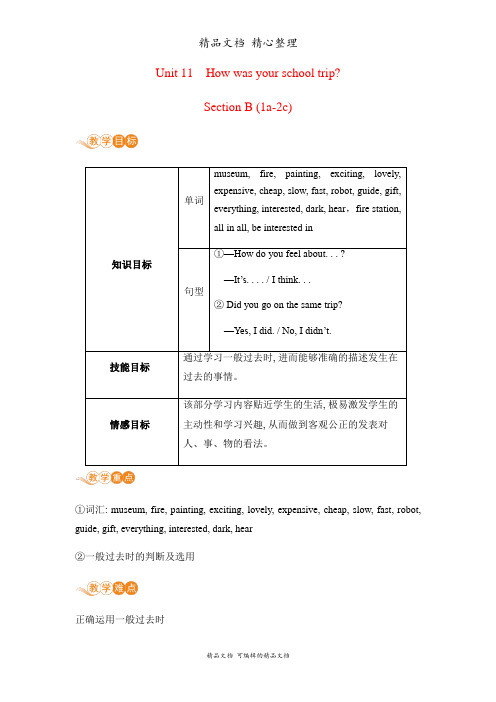
Unit 11 How was your school trip?
Section B (1a-2c)
①词汇: museum, fire, painting, exciting, lovely, expensive, cheap, slow, fast, robot, guide, gift, everything, interested, dark, hear ②一般过去时的判断及选用
正确运用一般过去时
2. Write a short passage about one of your trips.
长期以来受应试教育的影响, 学生的听力水平始终难以提高, 虽然听力测试
分数高, 但仍是“聋子”; 写作水平高, 却仍是“哑子”。
因此, 新课标要求教师在课堂上应努力做到让每个学生达到每堂课的听力目标、说的目标。
教师应充分做好课前准备, 熟悉每堂课的听力目标、说的目标; 充分估计学生在听的过程中可能遇到的障碍, 并考虑以何种方式解决; 充分考虑评价方式, 并做好评价记录(教师评价、学生自评)。
英语人教新目标七年级下册(2012年新编)Unit 11 Section A 教案2

Unit 11 How was your school trip?一、教学目标:1. 语言知识目标;基本词汇:milk, cow, horse, feed, farmer, quite, anything, grow, farm, pick, excellent, countryside, yesterday, flower, worry, luckily, sun, museum,fire, painting, exciting, lovely, expensive, cheap, slow, fast, robot,guide, gift, everything, interested, dark, hear基本词组:milk a cow, ride a horse, feed chickens, quite a lot (of…), in the countryside, fire station, all in all, be interested in基本句型:How was your school trip? It was great !Did you go to the zoo? No, I didn’t. I went to a farm.Did you see any cows? Yes, I did. I saw quite a lot.Did Carol ride a horse? No, she didn’t. But she milked a cow. Were the strawberries good? Yes, they were. No, they weren’t.2. 技能目标:能运用一般过去时描写过去的事情3. 情感目标:学会客观地表达对事物的看法,培养乐观向上的性格二、教学重难点:1. 教学重点:一般过去时的判断及选用2. 教学难点:正确运用一般过去时三、教学步骤.Section A (1a-2d)Step1. Warming –up1. GreetingWho is on duty today?Who was on duty yesterday?What is the weather like today?What was the weather like yesterday?2. Song. Play the song “ Old MacDonald had a farm” and have Ss find out the animals in the songGet Ss answer like this. On the farm ,there are some ducks, cats,chickens, cows pigs,dogs and horses. They are animals.Step2. Presentation1. Show a picture and tell Ss. This is also a farm. Last week Carol and his classmates had a school trip. They went to the farm. What did they do on the farm? How was their school trip?2. Show some pictures again and try to get the past tense verbs expressions according to the pictures.(1) Show the picture and the question(2) Ask one student to answer the question.(3) All students read it together.Q. Did he ride a horse?A. Yes, he did. He rode a horse.Q. Did he milk a cow?A. Yes, he did. He milked a cow.Q. Did he ride a horse?A. No, he didn’t.Did he feed chickens?Yes, he did. He fed chickens.Did you go to the zoo?No, I didn’t. I went to a farm.Did you see any cows?Yes, I did. I saw quite a lot.Did they pick any strawberries on the farm?Yes, they did.How were the strawberries?They were delicious.Were the strawberries good?Yes, they were.No, they weren’t.How was your school trip?It was great.Were the strawberries good?Yes, they were.No, they weren’t.Step3. ExercisesStep4. Practice (Listening and speaking)1a Match the phrases with the pictures.1b Listen and circle the three things Carol did on her school trip in 1a.1c Ask and answer questions about Carol’s school trip.2a Listen and check the questions you hear.2b Listen again. Circle T for true or F for false2c Ask and answer questions about Carol’s visit to the farm.Step5. Tasks1. Look at the pictures and practice the dialogueA. How was your school trip?B. It was …(boring/interesting/good/great…)A. What did you do on the school trip?B.I went for a walk with my classmates.2. 2d Role-play the conversation3. Group work. Make a survey. Ask your partners what they did last week. Then give a reporter.Step6. Grammar Focus ( Get Ss read aloud )How was your school trip? It was great !Did you go to the zoo? No, I didn’t. I went to a farm.Did you see any cows? Yes, I did. I saw quite a lot.Did Carol ride a horse? No, she didn’t. But she milked a cow.Were the strawberries good? Yes, they were. No, they weren’t.Section A (Grammar Focus-3b)Step1. GreetingHow are you today?How were you yesterday?How was your last school trip?Free talkT. Do you want to know something about your classmates’ school trip?Now Ask your partner. What did you do on your school trip? Then fillin the following chart.Step2. Pre-task1. Look at the pictures and fill in the blanks.2. Write the past forms of the following verbs.3. Check the past forms. Then ask Ss to summarize the rules of past forms ofthe regular verbs.Then explain the rules of past forms of the regular verbsStep3. While-task 3a1 Ask Ss to read the letters in 3a.2 Ask Ss to complete Jim’s letter on the left and Bill’s reply on the right.3 Check the answers. Ask Ss to pay attention to the past tenst verbs.4 Explain the language points5 Read the letters together.Step4. Post-task1. Challenge.Ask Ss to fill in the blanks according to the pictures.2. Check the answers. Ask Ss to read the answers one by one.3. Have a student read the letter out aloud.4. Ask Ss to read the letter several times. Try to recite it.5. Group work. Make up a story. Each student adds a sentence. If he or shecan’t add a senten ce. He or she must sing an English song.You can begin like this.Last week I visited my aunt’s house.____________________________________________________________________________________________________________________________。
英语(新目标)七年级下册第十一单元教案
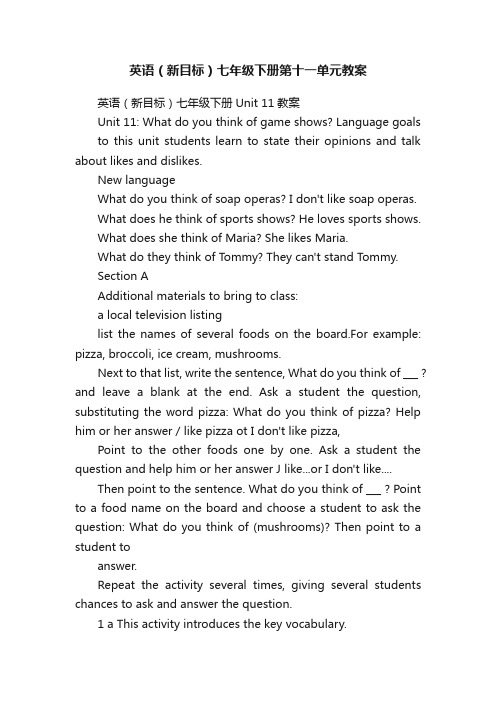
英语(新目标)七年级下册第十一单元教案英语(新目标)七年级下册Unit 11教案Unit 11: What do you think of game shows? Language goals to this unit students learn to state their opinions and talk about likes and dislikes.New languageWhat do you think of soap operas? I don't like soap operas.What does he think of sports shows? He loves sports shows.What does she think of Maria? She likes Maria.What do they think of Tommy? They can't stand Tommy.Section AAdditional materials to bring to class:a local television listinglist the names of several foods on the board.For example: pizza, broccoli, ice cream, mushrooms.Next to that list, write the sentence, What do you think of ___ ? and leave a blank at the end. Ask a student the question, substituting the word pizza: What do you think of pizza? Help him or her answer / like pizza ot I don't like pizza,Point to the other foods one by one. Ask a student the question and help him or her answer J like...or I don't like....Then point to the sentence. What do you think of ___ ? Point to a food name on the board and choose a student to ask the question: What do you think of (mushrooms)? Then point to a student toanswer.Repeat the activity several times, giving several students chances to ask and answer the question.1 a This activity introduces the key vocabulary.Focus attention on the five TVs. Say, Each TV shows different kind of TV show. In TV picture a, there is a an playing baseball. This is called a sports show.Talk about the other kinds of shows and ask students what they see. Tell the name of each kind of show as you discuss the picture. Ask students to repeat the names of the shows.Write the word sitcom on the board. Under it write the words situation comedy. Say, The word sitcom comes from the two words situation comedy. A sitcom is a funny show. The people in sitcoms do or say things that make TV watchers laugh.Point out the numbered list of shows. Say each one again and ask students to repeat it.Then ask students to match each TV picture with one of the words. Say, Write the letter of each kind of show next to the correct word. Point out the sample answer.1 b This activity gives students practice in understanding the target language in spoken conversation.Point to the smiley faces and the frowny faces and the words next to them. Read the words to the class or have a student do this. Say, These faces show you what the words mean. If you don't mind something, you don't either like it or dislike it. If you can't stand something, you dislike it very strongly. Your least favorite food is something you can't stand. If you love something, you like it very, very much. Your favorite food is something you love.Say, Now I will play a recording. Listen to what Mark says about the TV shows in la. Write the letter of the TV shows next to the words he uses.Play the recording the first time. Students only listen.Play the recording a second time. Point to the lettered pictures. Say, Each picture has a letter. Point out the blank spacesbefore the words. Say, Each word or phrase has a space in front of it. Listen to the tape and write the letter of a TV show picture in each blank. Point out the sample answer.Correct the answers.1 c This activity provides guided oral practice using the target language.Point to the pictures of TV shows in activity la and ask students to say the name of each kind of show.Point out the example conversation. Ask two students to read it to the class. Then ask the class to point to the picture of the sitcom.Say a dialogue with a student. Have the student ask ou a question. Then answer it truthfully. Point to the ppropriate picture as you answer. Say, Now work with a partner. Ask and answer the qstions.Have students work in pairs. As they talk, move round the room monitoring their work. Offer anguage or pronunciation support as needed.2a This activity provides listening practice using the target language. Call attention to the list of five "words and expressions.Point out the blank in front of each one. Ask a student to read the list to the class. Say, The people on the recording are talking about TV shows. They use these words and phrases as they talk about the shows. You will number these words and phrases 1-5 in the order you hear them on the recording.Play the recording the first time. Students only listen.Point out the sample answer 1 in front of the word love. Say, The first word on the recording is love in the sentence I love it. So the answer in front o/"love is number 1.Play the recording again. Ask students to write a number from 1 to 5 in front of each of the words and phrases.Check the answers.。
Unit11第3课时(SectionB1a-1d)(教学设计)七年级英语下册同步备课系列(人教版)

(三)新课呈现(预计用时:25分钟)
知识讲解:
清晰、准确地讲解本节课的新词汇和日常对话的语法结构,结合实例帮助学生理解。
突出重点,强调难点,通过对比、归纳等方法帮助学生加深记忆。
互动探究:
设计小组讨论环节,让学生围绕日常对话展开讨论,培养学生的合作精神和沟通能力。
鼓励学生提出自己的观点和疑问,引导学生深入思考,拓展思维。
技能训练:
设计实践活动,让学生在实践中体验英语的应用,提高实践能力。
在新课呈现结束后,对所学内容进行梳理和总结。
强调重点和难点,帮助学生形成完整的知识体系。
(四)巩固练习(预计用时:5分钟)
随堂练习:
随堂练习题,让学生在课堂上完成,检查学生对词汇和句型的掌握情况。
D. I am doing my homework now.
答案:D. I am doing my homework now.
3.题型三:阅读理解题
题干:请阅读以下短文,回答问题。
例文:My name is Tom. I am twelve years old. I like playing sports. My favorite sport is basketball. I go to school every day.
情感升华:
结合日常对话,引导学生思考英语与生活的联系,培养学生的社会责任感。
鼓励学生分享学习英语的心得和体会,增进师生之间的情感交流。
(六)课堂小结(预计用时:2分钟)
简要回顾本节课学习的词汇和日常对话内容,强调重点和难点。
肯定学生的表现,鼓励他们继续努力。
布置作业:
根据本节课学习的词汇和日常对话内容,布置适量的课后作业,巩固学习效果。
- 1、下载文档前请自行甄别文档内容的完整性,平台不提供额外的编辑、内容补充、找答案等附加服务。
- 2、"仅部分预览"的文档,不可在线预览部分如存在完整性等问题,可反馈申请退款(可完整预览的文档不适用该条件!)。
- 3、如文档侵犯您的权益,请联系客服反馈,我们会尽快为您处理(人工客服工作时间:9:00-18:30)。
Unit 11 How was your school trip ?
Period 3
Section B (1a-2c)
一、教学目标:
1. 语言知识目标
基本词汇:milk, cow, horse, feed, farmer, quite, anything, grow, farm, pick, excellent, coutryside, yesterday, flower, worry, luckily, sun, museum,
fire, painting, exciting, lovely, expensive, cheap, slow, fast, robot,
guide, gift, everything, interested, dark, hear
基本词组:milk a cow, ride a horse, feed chickens, quite a lot (of…), in the countryside, fire station, all in all, be interested in
基本句型:How was your school trip ? It was great !
Did you go to the zoo ? No, I didn’t. I went to a farm.
Did you see any cows ? Yes, I did. I saw quite a lot.
Did Carol ride a horse ? No, s he didn’t.But she milked a cow.
Were the strawberries good ? Yes, they were . No, they weren’t.
2. 技能目标: 能运用一般过去时描写过去的事情
3. 情感目标:学会客观地表达对事物的看法,培养乐观向上的性格
二、教学重难点:
1. 教学重点:一般过去时的判断及选用
2. 教学难点:正确运用一般过去时
三、教学步骤:
Step 1:1 Greeting
What did you do yesterday ?
How were you yesterday ?
2 Review: Games
Use your imagation and make up a story. Each student adds a sentence.If
he or she can’t add a sentence,he or she must sing an English song.
Step 2 :Preparation 1a
1 Match the activities with the pictures.
2 Check the answers
Step 2 :Listening 1b 1c
1 Listen and answer the questions.
1 How was Jane’s trip ?
2 How was Tony’s trip ?
2 Check the answers.
3 Listen again. What did Jane and Tony do on their last school trip ? Check
Tony or Jane.
Step 3:Speaking 1d
1 What was your last school trip like ?
Discuss it with your partner with the following words.
2 Teach Ss to read the following words :
interesting difficult lovely slowexciting boring cool hot lucky
large expensive terrible decilious great cheap fast
3 Discuss like following conversation.
A: I went to a farm on my last school trip.There are many animals on the farm.They are very lovely.
B: That sounds great.
A: How was your school trip ?
B: It was __________
A: How was the food there ?
B: It was _____________
A: How was the weather ?
B: It was ___________
Step 4: Prepatation
2a Do the following words describe good things or bad things ? Put a √for good and an ×for bad . Leave a blank if they can mean both.
Step 5 : Reading 2b,2c
1 Read Helen’s and Jim’s diary entries and answer the questions in 2b
2 Read the diaries again and complete the chart in 2c
How do Helen and Jim describe these things ?
3 Check the answers .Ask Ss to pay attention to the past tenst verbs.
4 Explain the language points
5 Read the passages aloud
Step 6 : Language points and exercises.。
